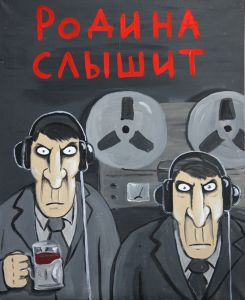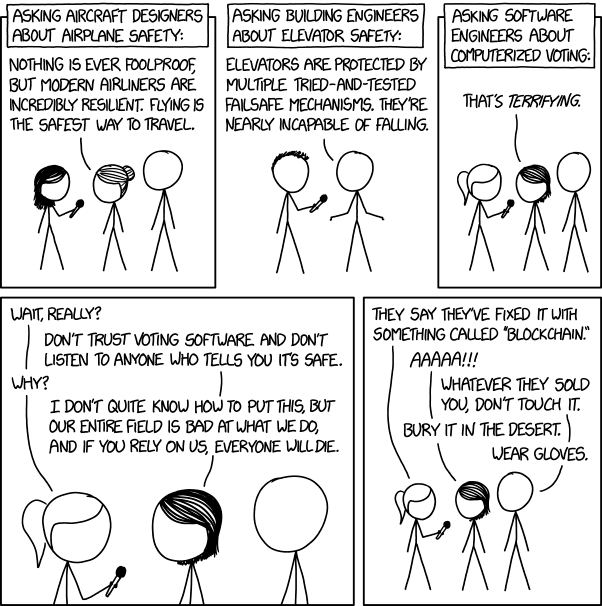Japan has been in the year 2000 for the past 50 years.
Not the first time I see this, still makes me laugh
Why the fuck “cash society” is backside? It means they care about privacy.
Not taking cash = backwards.
Not taking digital payments = also backwards.
suggesting crypto?
They’re just suggesting that you should accept both cash and electronic payments.
that sounds weird though. is he suggesting that one should be fed to a tree? eff that.
I’m not responding to that comment?
Get fed right to the joshua trees.
what
Yes
ugh you suggest i should be fed to a tree?
Yes theyre hungry
The post isn’t about privacy, if it was, faxing wouldn’t be on there. I’d wager a strong guess it’s about convenience on one hand while choosing to be inconvenient on the other.
Edit: or maybe it’s more about high tech in some sectors and low tech in others, still not about privacy.
Why privacy would mean no fax? Fax is mostly more secure than email.
Fax is unencrypted. Encrypted versions apparently exist but that’s not what Japan and Germany use.
And that aside my mom regularly gets sensitive patient data via fax at her workplace because the number is one digit off some doctor’s (bonus points for the inverse also happening, and her also working with sensitive data). Far less likely to happen with email. At most encrypted fax is equally secure.
Most emails are unencrypted. And indeed, in the medical profession, they were widespread. Nothing can protect from the sender putting in the wrong number or email address. I’ve received some seriously sensitive emails not meant for me because the people made typos and the recipients had the same family name as me (not sure how the email server decided it was close enough and delivered them to me).
I’ve also read for some businesses, it was critical to get an instant receipt that the fax has been properly received.
Now, I’m not defending using obsolete fax machines, it just had one advantage over email but today there are much better alternatives and dedicated platforms.
Most emails are unencrypted.
No, they are not. They are not end-to-end encrypted but they are encrypted between your PC and your service provider, between service providers and between service providers and receivers. End-to-end encryption is needed to defend against your service provider or entities that can order your provider around but not against random hackers snooping around in your network.
Fax on the other hand is never encrypted and also not signed, so there is no integrity protection. Fax is far, far less secure than even standard email. Businesses require fax often for legal reasons because laws are written by people with no technical understanding not because of any technical reason.
No, they are not. They are not end-to-end encrypted but they are encrypted between your PC and your service provider, between service providers and between service providers and receivers. End-to-end encryption is needed to defend against your service provider or entities that can order your provider around but not against random hackers snooping around in your network.
This is true AND untrue at the same time! It’s true that most e-mail providers will talk to other e-mail providers with TLS, but it’s trivial to downgrade the connection in most circumstances. If you can man-in-the-middle e-mail servers you can just say “hey, I’m the e-mail provider you’re trying to talk to, I don’t support TLS, talk to me in plain text!” and the senders will probably oblige. There’s a few standards to try to address this problem, like DANE (which actually solves the problem, but is unsupported by all large e-mail providers), and mta-sts which is a much weaker standard (but supported by gmail and outlook). In practice there’s a good chance that your e-mail is reasonably well secured, but it’s absolutely not a guarantee.
That depends on the specific TLS setup. Badly configured TLS 1.2 would allow downgrade attacks, TLS 1.3 would not. I highly doubt the “in most circumstances” line, my guess would be that at least the big ones like gmail don’t allow unsecured communication with their servers at all. If not for their users’s privacy, then at least to combat spam.
It is however point-to-point plus doesn’t go over a public network and the routers of “random” 3rd parties (as IP does not necessarily route your packets always via the same path, and NNTP - the e-mail protocol - is even worse).
Faxing is probably is inherently more private simply because generally there is just 1 company controlling the entire network it travels through (i.e. the phone landline network), though I would hardly call it secure.
Properly encrypted e-mail is more secure with regards to the contents but it leaks metadata (that there was a message of a certain size from a certain sender to a certain receiver at acertain time) to a lot more 3rd parties than a fax would.
doesn’t go over a public network
Your fax just went over public telephone network.
and NNTP - the e-mail protocol - is even worse
Wow, I haven’t seen NNTP in ages. Who still uses newsgroups? And how they even use it for email?
Yeah, you’re right - it’s SMTP not NNTP. Considering that back in the day I used to telnet to port 25 of my uni’s server to send e-mails portraying as one of my teachers to take the piss of my friends and hence knew at least some of the protocol, I must be getting old to confuse the acronyms.
But yeah, the main point is not the network being “public” (in the sense that anybody can access it) it’s that - as I explained but you seemed to have missed - the intermediate hops for an e-mail travelling on the internet can be owned by just about anybody and, worse, not necessarilly in your country working under local laws - routing will often send things around in quite unexpected tours on a physical sense depending on network topology - whilst the nodes the fax data travels on a phone network are generally owned by just 1 company or 2 (the latter in countries with multiple landline providers if you send it from a phone in one to the phone in another, as the network topology is much simpler and all providers connect to each other directly).
If your data goes over at most only 2 networks owned by very specific companies it is inherently safer from eavesdropping that if it goes over an unknown number of networks owned by an unknow number of companies. This is not the same as saying it’s “safe” - it’s just one relative to the other, rather than an endorsment of faxing.
Also there are usually laws around eavesdropping on phone calls, from the old days, whilst it’s the Wild West out there when it comes to those operating intermediate nodes eavesdropping on e-mails.
Frankly, if you can’t send the data encrypted, then faxing is probably safer from a privacy point of view (it would take a crooked telecoms operator risking their license, a Court Order or physical access to eavesdrop on it), but if encrypted e-mail is safer at least content-wise, though as I pointed out plain e-mail with unencrypted headers leaks meta data even if the contents is encrypted.
to send e-mails portraying as one of my teachers to take the piss of my friends and hence knew at least some of the protocol
Nowdays client-server and server-server communication is ecrypted and signed, so no an issue now.
not necessarilly in your country working under local laws
Scary part when they do

fax security is de facto nonexistant
Because phone numbers and plain text.
Because a piece of highly debated governance structure, manifest as a piece of technology was put on the “bad” list, (by accedent?) implying the old way is out of date and switching is as much of a “you dont need to think, its just better” (no brainer) as switching your floppy disks and CRTs for USB sticks ano OLEDs. Tech advancing is usually but not a definite good thing.
And money recycling.
Suuuure, “privacy”. Wink wink.
I’m a criminal! Wank wank, nudge nudge
Not necessarily. It might be privacy but it could also be a combination of other reasons too - a cultural aversion to paperless transactions, a lack regulation for electronic payments, lack of a decent indigenous payment system, lack of financial safeguards, prevalence of fraud / skimming devices etc.
Some European countries were more into electronic transactions than others but with stuff like SEPA, chip & PIN, contactless payments I think most people are just fine using electronic payment unless they have reason to control the transaction in some way. For example I usually pay pretty much everything electronically but I still pay taxis and most restaurants with cash. Also tradesmen if they’ll give me a discount for cash.
I used to work in a shop when I was younger, and the older generation always asked for “cash discount”. Why on earth would we do that, my boss said to me. We need the money to be in the shop’s bank account, not laying around somewhere and not being used.
I remember carrying several 100k of our money, late at night, to our banks night safe and drop it in. That sucked. And they charged us for this too
Cash is off the books so there is an incentive for certain kinds of businesses like tradesmen to take cash because it still works out cheaper since they don’t have to declare it to the taxman.
deleted by creator
Question: do the Japanese actually care about privacy? I know I do, but if you were to ask a Japanese person why does their country use cash, would they say “We have considered a system of payment cards and decided against it for privacy reasons” or would they just shrug and say “I dunno, I’m not in charge of payment systems, I use what I have”?
When I found out about all that I was honestly kinda glad my country, Germany, isn’t the only one that’s in the past in terms of bureaucracy and digitalization of services.
But cash is a weird point to add. A society without cash would kinda be dystopian ngl
Without cash, you can’t have privacy. All card or contactless payments are logged and probably sold to advertisers or anyone with enough cash who wants that info.
Very true. But those advertisers and data brokers (and governments) have convinced most people that the convenience is worth it, and that only criminals desire that level of privacy.
They can’t stop me from using cash if I want to though. It is legal tender for all debts, public and private.
It is legal tender, but you can’t force people to accept cash in their own businesses. Before you walk into a store, they can say we do not accept cash. By walking in and buying, you agree to not use cash
Yeah but that doesn’t happen. Cash payment is the default standard that backs up the other forms of payment that depend on Internet / phone infrastructure and electricity.
No business that I have ever patronized has refused cash, but many have been cash only and were not able to accept cards or contactless payment. Power outages, Internet outages, etc all can bring down payment systems’ infrastructure.
That’s how it is in the USA, and it’s a good system. Cash is reliable and puts the entire monetary purchasing power into the literal hand of the citizens, versus cards and other digital payment systems that can be controlled by authorities to deny your access to your own money.
It does around here (Norway). I’ve never even seen how our cash looks like since the late 00s.
The US is a shit system made for fucking the average tax player in the ass
Sounds like you don’t know what you’re talking about. This all works fine in the USA for us, it’s not a bad system at all.
I have ALL options available to me - cards, contactless payment, cash, credit, whatever. I celebrate the fact that cash is an option that lets me avoid having every data-hoarding entity collect records of my purchases.
Taxes aren’t fucking me anywhere, I pay them and I get government services and infrastructure in return. Taxes aren’t hurting me at all in fact.
Debts, yes. But businesses don’t have to accept cash if you pay before the service is rendered or the product is purchased.
Businesses in the USA, especially regions with a higher proportion of black or hispanic residents, will go out of business if they stop accepting cash. It’s not going to happen.
I’m an immigrant in Germany and kind of had to laugh at this, because the cash thing is so hard for foreigners here. Since the pandemic it’s been better, but I had multiple moments before it where a grocery store or gas station only accepted cash with zero warning.
I didn’t like having much cash on me at first, because I was worried about losing it or having stolen. After about a year, I did lose my wallet, but the found things bureau at town hall called me to return it, cash still inside it. They charged 10% (iirc) and split it wiith the person who found it.
Edit: name of town hall changed for clarity
I’m currently in Scotland and have experienced the exact opposite xd I was kinda shocked when certain shops and stalls at festivals only offered card payment. Like just a few days ago I went into town and saw that the Christmas market was already up and running so I thought I might as well buy myself a mulled wine. At the stall I realized I didn’t have that much cash on me (especially since mulled wine is extremely expensive in Scotland for some reason. Borderline scam lol) and asked if card payment would be okay thinking they would refuse since it’s just a stall on a Christmas market so why would they be able to accept card payments right? The clerk answered “Oh yeah we only accept card anyway”. I was kinda shocked a bit but I got my mulled wine so all’s good :D
Why should the town charge you?
They provide a service, why wouldn’t they? As a student, I didn’t pay any taxes, but I still benefit from the service. If I had had my rent payment in the wallet or hadn’t been able to afford it, I might have tried to cap it, but it was like 60€ total (for a payment of 6€, not a payment of 60€), so I wasn’t bothered.
Because its a public service funded by taxes? Ok now I understand if you didnt pay any
I’m not sure if it’s partially funded by taxes or just the profit from the found things, because I’ve only dealt with them the once. I’d assume it’s at least partially funded by taxes, because they’d need to find a lot of lost things otherwise. I don’t know if a taxpayer still has to pay a fee, but I suspect so, based on how things generally work here (though they’re also generally sympathetic, in the case that someone does have their rent or something that they can’t afford to pay in the wallet, though there probably is a cap on how much someone would have to pay).
I think of it basically as a deductible for the lost item insurance.
Edit: I realized the problem. The found things bureau called me, I just felt like that was a weird translation so said town hall. Sorry lol
Removed by mod
Guess I’m the only one in the thread that hates cash. It’s filthy and messy. Much better to just beep my watch and move along
The one thing I don’t like about digital payments is that so far, they’ve all been owned/controlled by various major card processors, like Visa. That control really gives those processors a dominant position and basically free money.
This. I love how much easier it is to manage digital make-believe numbers, than tons of leaflets and pucks that represent make-believe numbers.
I just wish the system that handled it was more… democratic? Instead of corporate feudalism with credit scores…
You mean like a cryptographic, decentralized, digital currency?
Loved the idea behind satoshis. Even tried it out. Even made a little money and got out before it all crashed.
It was an interesting concept until all the mega-grifters showed up to make it yet another speculative commodity to fuel their insatiable gambling addictions.
I consider myself pretty knowledgable in lots of computing topics but even I felt very shakey at the sheer paranoia required to keep digital currency safe. (Assuming it doesn’t suddenly become worthless overnight on its own).
I can’t imagine normies navigating that. And using paypal or a bank or something put you right back at “not your coins” anyway.
Personlly, dumping 100% of it all at once purged a LOT of anxiety.
Plus, accounts are readily trackable on public ledgers. Not very private as soon as various means are deployed to know your public account.
The thing that saddened me most was seeing how much freaking energy and technology was thrown on the pyre of make-believe numbers. The “metaverse”, web3, the fact NFTs even happened. Hardware shortages whenever some new coin figured out how to store a hash on it. Super sophisticated scams everywhere…
If anything it was definitely a psychological experiment to see what intangible nonsense even entire nation-states would devote massive resources to instead of feeding or housing people.
Not to mention the huge mess with constantly changing laws and taxes from officials who struggle to send emails.
Plus, and finally, it was supposed to democratize money unlike fiat currency, but it was worth fiat currency, so the a-holes hoarding all the fiat currency just gobbled up all the digital ones too and tried to sell it back to us.
Maybe we’ll get something better in the future.
I really just don’t care. The ATM you got the cash from gets a cut of the fees. It’s all corporate bullshit anyway
I really just don’t care either, Ill just pay who im forced to, 1/10th of my paycheck (it costs them pennies to make) or I could randomly die. It’s all corporate bullshit anyway. /s
I really just do not care, Ill just take out a loan I cannot afford so I can stop playing chicken on crosswalks and avoid dieing to that driver who is on their phone, not paying attention. Its just human bullshit anyway. /s
glad we can agree!
deleted by creator
Because theft of money via credit cards is a thing thats never happened.
It’s much easier to roll back a fraudulent electronic transaction, than a fraudulent cash transaction.
Yeah, my credit card is just a buffer for my actual cash. I buy. Something happens, maybe a defective product, and merchant is being a piece of shit, I just disoure that shit. With cash, that’s it, you are done.
That being said, here I am, new cars in the mail because somehow it was compromised and someone wanted to buy some junk in Ohio I guess. So there’s definitely the inconvenience associated with that. But when young Dozzi92 was an idiot and lost his wallet, carda get replaced, but missing cash is missing cash.
Yep. And my Apple Card rotates its number automatically so even if my number is stolen it just vanishes after a while. Technology!
Oh yeah. Maybe it’s because I’m still in the just-got-my-first-credit-card phase, but damn I love that little piece of plastic. I’m clumsy and suck at using cash, but I feel so graceful with a card.
Cash should always be available and accepted, but personally I absolutely avoid it unless absolutely necessary.
I can’t remember the last time I used cash too buy something.
I only use cash to buy things from people in my area.
As soon as I could pay for things with my phone, I did. Now I’m annoyed when I can’t.
Agreed. I think cash should always be there as a fallback. But 9/10, I prefer to use card because cash is so dirty, and is harder to keep track of.
If I go to my bank app. I know exactly how much I have. Whereas if I keep cash in my wallet, I have to count it all out and keep track of it in my head. I don’t like that. It’s just more awkward for me.
Yes but how do you pay your prostitute? I’m surely not in the mood to explain my wife what’s that $200 transaction on my card from a MELINDA TEEN at midnight that day I was supposed to be late at work.
the fuck is wrong with you
You don’t pay for sex? You must be a communist!
Fuck off troll
Thank you, you too.
I think someday we will look back and consider if taking everything digital was ever the right choice. Friend always uses the term, “high tech downgrade.” The more I interact with the internet the more I learn how it pushes the limits of our society in not so great directions.
I think the opposite can be said too. t’s pushed society forward in so many great places as well.
I’m not saying there should be no internet. I am only saying maybe some restraint would be advantageous for everyone.
Everything evolves as a wave of extremes and eventually finds some sort of equilibrium, trying to contain that is a fool’s errand.
Sounds like your own personal philosophy
Or a new normal… paved roads and cars in the US was once pretty extreme, until it became normal. Did you be it’s grownup and tell it to go to bed on time, did you make a futile effort to stunt its growth or did you roll over. Story of the frog in boiling water.
Ever notice how some roads aren’t paved?
Thing is, the Internet at its core is just a vastly interconnected network. That’s it. All the effects of the Internet are direct consequences of that fundamental property, and time.
The technological architecture that supports the complexity of modern civilization? The direct consequence of interconnectivity × time. QAnon? The direct consequence of interconnectivity × time.
You can’t restrain the bad without crippling the good.
the Internet at its core is just a vastly interconnected network.
Nothing about what you said invalides my point.
Not every human transaction has to be made over the internet. Other technology’s are sufficient and do not cripple society.
You can’t restrain the bad without crippling the good
That part. “People should…” is an impotent sentiment. How do you incentivize, or force, a regression to “sufficient” technology? How do you do so without affecting beneficial network technology?
By learning from the past. See, in your mind you’ve already established all technological advancement is beneficial.
I think you might be misinterpreting my point.
Nah
Ok… good talk.
Why are you responding to me on the internet?
… why don’t you have reading comprehension?
Maybe it’s the Internet. You should show some “restraint”.
because Reductio ad absurdum is easier than confronting hard truths they don’t want to accept and possibly risk firing off a dreadful thing called a “thought” in that inert mass of jello they call a brain.
I agree.
Digitizing some things, like medical records and rare texts, have been extremely useful.
Digitization of records in general is extremely useful.
I think the problem was that technological advances were faster than social ones. We ended with new ways to control people, and new forms of inequality.
Many of our problems with technology are rooted in a company abusing from their power. Even the troubled ways we communcate online today are a product of how bigh tech manipulated social networks.
The Internet is great. It connects people. I learned so many things even I lived in a small town in a third-world country.
But ads, scam, and 15-second videos are bad. The current Internet is nasty and not as beautiful as it was.
Two sides of a coin, I suppose.
Everyone who is saying there is nothing wrong with cash is right. However, there is one major drawback to cash which is no longer a big problem in societies which are mostly cashless. Namely, if your wallet gets stolen and you have $300 in it, you’ve lost that $300 forever. If your wallet gets stolen and they get your cards, you can just cancel them and aren’t even charged for fraudulent purchases.
I realize that means less privacy, but I can’t afford to lose that kind of money just walking to the supermarket to buy groceries.
They solved that problem by having no thieves lol
I was just in Japan and how safe it was blew my mind.
This sentence makes me laugh. Where are you from?
Probably Detroit
Argentina, unfortunately.
For me, the main drawback is rather than you need to get to a machine to get your physical money pieces regularly. Sometimes you run out, there’s no machine, or you have no time to find one, and it can put you in troubles, like being stuck in the middle of transit or getting at the cashier and realizing you don’t have enough.
Your in a cash+card hybrid country, right? In my country at least, you can go into a chain grocery store, buy somthing (doesnt matter what) and pull a small to medium amount of cash from your card. They are (slowly as to not alert people) trying to tear that system down and go cashless.
Before I kind of blundered unintentionally into going mostly cashless, I’d just get cash out when I went grocery shopping. But thankfully by the time I was in charge of my own money it was pretty rare to need to spend money without the option of paying via EFTPOS.
Thanks for teaching me the abbreviation EFTPOS.
Welcome :)
It was pretty common to hear people talk about it for a span of about 10-20 years in Australia. For as long as I can remember every bank gave you a card that was not a “true” credit or debit card, but would work in the EFTPOS machines of any domestic store. They were called Redicards, and were basically debit cards you couldn’t use online (once internet shopping became a thing), but worked in ATMs, stores etc. Even back in the 00s it was rare to see someone pulling out a cheque book to pay for anything, and now it’s basically unheard of. Talking to US friends I get the impression Australia beat them to this level of wide-spread electronic payments, by quite a margin.
This year the Redicard network is shutting down and I just got issued a second Visa debit card by my bank to replace it. End of an era…
Valid point. But I assure you if you lose your wallet in Japan with $300 in it (because, statistically, nobody will steal your wallet), you’ll find it at the police station next day.
(That’s the most statistical thing that can happen, please do not try.)
Went there on vacation recently and my girlfriend left her luggage in an elevator and forgot it for 15 minutes. It was at the police box a block over.
Finally a positive post on Lemmy!
Wallet in a cashless society? Are you stuck in the early 2000’s?
Now, cashless means Phones+NFC, which means when your wallet, a.k.a your phone, gets stolen you get taken somewhere until you allow access to your phone and banking apps where there should be an easy 10~30k in savings + loans they can extract
GG
People have savings? Sounds like the 90s.
You think people don’t have and use credit and debit cards anymore? Really?
“Taking you somewhere” is far too much effort. They can just watch you enter your passcode on your phone in a bar, then swipe your phone from you and gain access to all your accounts.
Biometrics are good for some things.
Yeah, for getting kidnapped 🤣
Where you getting the 10k figure, and how many people do you know who would have thay on hand.
Here in Brazil most better-off people have access to that in easy-to-contract loans in banking apps like Nubank, etc
This scenario is of course impossible if you only carry cards or money 🤷
/s
Banking app access ransom isn’t the same as the good old ransom family for money, the risk/reward ratio is so much better
You also won’t have that money to spend if the power goes out.
Manual credit card machines have existed long before electronic ones.
That’s just absurd. Who the hell has one anymore? Not to mention they require the card to be embossed and not all are anymore.
You can literally write down the number on a piece of paper and a price and let the bank know or enter it manually when the power goes back on. This simply isn’t a problem unless society collapses and if that happens, cash will be worthless too.
I’ve worked in multiple retail stores and not a single one of them would do that. If the power went out, they lock the door. So that absolutely doesn’t work in the short term.
Long term? Idk, how long can you hold out w/o spending money?
deleted by creator
im gonna press X to doubt that you carry $300 to the grocery store, let alone that you carry that much groceries by hand while walking home
Yeah homie I dunno there. I’m in Quebec right now and it’s extremely rare for me to get out of even a simple grocery run for less than $200. I could easily carry home 300 dollars worth of groceries, even buying mostly generics.
$300 is not at all unusual for groceries these days if you have a family.
It is not hard to rack up $300 in groceries where I live. I’m lucky to walk out w/o spending at least $100 for my smaller trips.
And that’s just for me.
$100 is my weekly beer bill.
I had my wallet stolen years ago, within an hour someone had purchased thousands of $$$ worth of MacBook pros from the Apple store.
Don’t lose your debit card!!! The bank doesn’t do charge backs!
how?
they would need a pin for that, for contactless payment there is a limit, I believe 200 euros in my country.
so did you write your pin down on a paper and put it in your wallet or do you have your money stored at a terrible bank?
I don’t know about elsewhere, but in the US you can run a debit card as a credit card without needing the pin. Pin is only required for cash back.
Germany is the same but without the bullet trains and the robots wiping your ass.
Well, also plus random homeless guy yelling at you about Vladimir Lenin, the roads looking like Romania ca. 1983 and a cadre of stern government employees showing up out of nowhere to shout “NEIN!!” and disappear. Very futuristic in a sort of Metro 2033 way.
As a Romanian, that would be overestimating our ability to maintain roads.
Roads? Where we’re going we won’t NEED roads!
It’s Romania, we’re going to Romania.
we have plenty of bullet trains - 367 last I checked, plus bullet trains from other countries - they’re just chronically late because of car-focused policies over the last decades causing the infrastructure to basically rot away.
still no ass-wiping robots though, maybe one day…
deleted by creator
deleted by creator
yeah we have a bunch of ICEs, but no transrapid for us. japan has a bunch of maglev trains.
Japan has one maglev line under construction with a completion date set for 2045.
Yeah, when I think of Germany, I think of papers.
Germany doesn’t have bidets? France does.
Bidet as it may
You put paper filing and cash society on the “bad” list. It’s like it’s wrong for people without an internet connection or privacy conscious people to file stuff. “Pls use our brand-spanking new web UI that loads a shit ton of Javascript and steals your data on top of it!” Oh and cash society. No, why would anyone want to pay in a privacy-conscious way. Naw man, pay with a card…
With a way less harsh tone, I agree with your first point. Credit cards magical for the user but are full of deamons that they cant see just by using it. I’d prefer a cash only society to one where a private company controlls all access to money. Hybrid is alright but makes the situation maluable (in my country, because of the card, some compamies will make it hard or refuse to take legal tender).
“Pls use our brand-spanking new web UI that loads a shit ton of Javascript and steals your data on top of it!”
You derailed your point, biggest thing you can do right now is use ublock or noscript. Pull as much money as you need in cash and live off of it instead of using your card.
It’s not about having the option, I love having alternatives. It’s about 90s ways being the only choice when they could have better options. E.g. You need to send a form. It’s already a pdf file, send it by email, right? No, it has to be physical mail… or fax if they have a number. Oh, and you have to stamp on it. No pdf. Multiply that by time constraints and local bureaucracy mixed in.
I’d argue using cash, paper, floppies is fucking advanced and the right move.
Source - I work on tech

Mini Rant:
When you think about it software development is a relatively young profession compared to medicine, law, construction, public services, the arts, and so on. This is why modern tech kind of sucks despite being so cool, I say we are in the “Hey maybe we shouldn’t build our huts right on the river” phase of writing code, still figuring out problems that will appear mind numbingly simple in the future.
Another issue is the fact that tech builds on itself and its flaws can be painted over with abstractions, while the aforementioned professions can’t get away with being subpar for too long. So the full metaphor really is after the river floods we build on top of the ruins and claim victory because we are slightly more elevated and will take less damage during the next flood.
The secret to better tech is rebuilding everything from scratch. The internet wasn’t designed with security and bad actors in mind. Plenty of corporations are running a Frankenstein system that contains code older than most millennials, botched modernization efforts, buzzword laden over-engineered applications, and bugs that aren’t features just permanent residents in your code base.
…But there is profiteering to contend with, good code takes time, time is money, good code is expensive. “Good enough” code is easy to write, so its better for the bottom line.
In the end it really is…
Developer: “Hey the river flooded and our huts were demolished, we should move to higher ground and build there”
Corporate Leadership: “No that is too expensive, just build on the ruins and next flood we should be safer, oh also you’re laid off”
I know you didn’t ask for this, but its been on my mind for a while and I felt like this was a good time to get this out of my head haha
The secret to better tech is rebuilding everything from scratch. The internet wasn’t designed with security and bad actors in mind. Plenty of corporations are running a Frankenstein system that contains code older than most millennials, botched modernization efforts, buzzword laden over-engineered applications, and bugs that aren’t features just permanent residents in your code base.
Rebuilding everything from scratch will take ages and cost everyone a lot of money, because you have to replace all your hardware (router boxes, PC s, phones, smart watches, …), because the internet protocols are often designed into the hardware itself, and changing them fundamentally means a lot of trash. Also there is no system that guarantees that the result will have fewer issues or will not required to be succeeded by something else a couple of minutes later, because some new issue was discovered.
Also software is highly complex and need to adapt to many different scenarios, while maintaining compatibility to each other, which the other disciplines of human engineering don’t have to deal with as much, they are much more purpose driven.
It is like trying to create a universal building code (for building houses) that simultaneously works on every country on earth, hell, maybe even on multiple planets, with wildly different and constantly changing environments and is guaranteed to result in save houses. Not really possible in one shot, only possible by constantly trying to adapt. That is what software has to deal with. I am talking about fundamental software like the Linux kernel here, for example.
You cannot just start over and be better.
Enough with this American take, electronic voting works fine in Brazil, only right wingers complain about it, and the American ones also complained about their paper votes when they lose.
What does the Brazilian electronic voting system do that allows you to trust it? I’m not trying to bait or anything I know nothing about it and want to be informed.
Luckily in many European countries it is not used.
I would credit institutions like the chaos computer club and other non-profits, which where instrumental in convincing the government about the dangers. It was a difficult battle against the corporate lobbyists, and is understandable that other countries could not fight against the corporate interests or corruption and succumb to use them.
There where and still are so many issues with them, one of the most fundamental is described by Ken Thompson in his Reflections on trusting trust, which is especially effective for electronic voting machines, where no other way of verification is possible.
Enough with this American take
Huston or whereever you are, you have problem. I live on other side of the pond. More specifically in certain biggest country, where Ella Pamfilova can pull out any number she wants from remote electronic voting.
electronic voting works fine in Brazil
It works here as intended too. Wins elections for Putin’s mafia.
only right wingers complain about it
4chanland, you have another problem. Putin is right wing. And he is super happy about it.
and the American ones also complained about their paper votes when they lose.
I don’t know what Americans complain about when they loose.
Wait…wasn’t that a movie too?
I would love if we kept the floppy form factor but with SSD flash on the inside.
I loved the solid feeling of disks and that “kachunk” of the drives.
They were also easy to label!
Paper databases are a terrible system
Github uses black-and-white film. Depends. You can print qr codes or some other crazy encoding scheme.
Do you know the difference between warehouse inventory management and a database?
You didn’t say you wanted database for warehouse inventory managment. In that case paper only useful for storing append-only logs or taking snapshots.
You are probably talking about the arctic vault.
They use film for extreme archival purposes that are not representative of anything normal.
Qr codes can be great but they obviously need to interact somehow (not directly I hope) with a real database.
You are probably talking about the arctic vault.
Yes, github arctic code vault. It seems some people just don’t get it.
Qr codes can be great but they obviously need to interact somehow (not directly I hope) with a real database.
I mean QR codes as a mean of storing lots of data on paper, in a way that does not require humam or OCR for computer to read. Basically as a joke about paper databases.
How exactly is a floppy more advanced and the right move? Or fucking paper and photocopiers,/printers.
It’s like non-security tech savvy people embracing IoT devices throughout their homes - smart bulbs, smart toasters, etc - fucking disaster waiting to happen.
Keeping stuff offline with paper and floppies is exceptional SecOps. It’s obviously more work, and ease-of-use is degraded, but if we ever see real cyber warfare, having stuff on paper and/or airgapped storage is the best one can hope for
If you look a floppy disk from a weird angle, it will get a bad sector
What’s bad about cash?
Cash is fucking awesome
deleted by creator
Change / coins are pretty annoying imho
i think the issue is more that people don’t really understand what is good about cash and what is bad about the alternative
and the economic and societal reasons why cash is vastly preferable.
It stresses me out giving the cashier a math problem to solve. I know they can a calculator, but still.
That’s specifically a USA problem only. In the rest of the world, the price you see is the price you pay (not inc. restaurant service fees, etc, which are more BS exported from the US)
There is zero reason that the price sticker on a shelf or menu shouldn’t be what you actually pay. It’s not like online shopping where they need to calculate shipping based on distance, or tax based on state of the receiver. And there is no reason they couldn’t even put both prices on the sticker.
But in America, they do it for one reason: capitalism. It’s a marketing scheme. Makes you think you’re getting a better deal and paying less while you shop, so shoppers tend to spend more.
It’s why fuel costs $2.19 ^99/100
Because that’s seen as cheaper than $2.20.
Sorry, but they’re not going to be rounding that final price down to save you 1¢.
In short: you’re as much a victim as everyone else.
it’s because taxes vary per state. I don’t think it’s a good one, but it is a reason
Taxes don’t vary inside a store, you idiot. There are no physical stores that straddle state lines and charge you different amounts depending on which checkout you use.
I’m going to guess you’re both an idiot and you didn’t read my second paragraph where I mentioned this specifically.
I’ve worked at a till long ago. You ring up the customer then type in how much they gave you then the machine tells you how much change to give.
It’s not a million dollar problem, it’s a few cents issue. You’ll be fine
There was a movie about this, how a few cents of rounding error moved into an account generated a lot of money. Office space.
Nothing. It must be great. My weed dealer accepts nothing else!
As someone who filled out multiple copies of the same contract by hand to buy a house recently, which had to be stamped with my seal and not signed, AHHHHHHHHHHghgghhg. On average, I only have to fax something once every several years. NTT, the main telecoms provider, STILL requires that you fax paperwork to get internet (at least for NTT East as of two years ago).
Using cash is great (except for my airline miles account), but one of the biggest banks in Japan is notorious for outages. ATMs here also, until very recently, had business days and hours. That’s finally mostly gone, at least. They can still run out of money at the year-end holiday season as everyone is home with family and they’re not always restocked in some locations, but more ATMs also helped to solve this. The problem with things transitioning to electronic payment is also those payment processors take a cut. We have all kinds of payment apps here, but many small businesses I know hate using it. The ones I know that use it most generally have larger foreign customer bases (anecdotal to business owners I know; may not be generally true in all of Tokyo/Japan).
FAX machines is still a thing in 2023!
America’s healthcare system still lives off of fax machines
As a German -Homer disappears in hedge
We only have a bit of the first panel (technology wise) and all of the bottom one
I take pity on Japan as the only nation on Earth to fully internalize grind culture as their source of existential meaning to an even more toxic degree than the United States.
If they didn’t exist, I probably would deem such a thing unsustainably improbable, but there it is.
To be clear, I’m not referring to places where the poor are exploited to work even longer hours at more physically brutal jobs for basic survival, I’m talking about self proclaimed “developed” nations whose citizens are indoctrinated to proudly jump into the productivity volcano as some kind of honor/life’s purpose/sense of identity in itself, and who wouldn’t have it any other way.
South Korea is more the first case than the second, no?
Completely fair.
That said, when there was a proposal to increase standard work hours in South Korea recently, the people rejected it loudly. There is a desire in SK by many to achieve work life balance, which would be something of a slur in Japan.
Everything I’ve ever seen of Japanese culture would indicate so much as speaking against something like that would get you ostracized by the vast majority.
I’m not from the original “developed” nations but imo occupation is a pretty big factor in one’s identity.
Cash Society isn’t a bad thing imo.

























